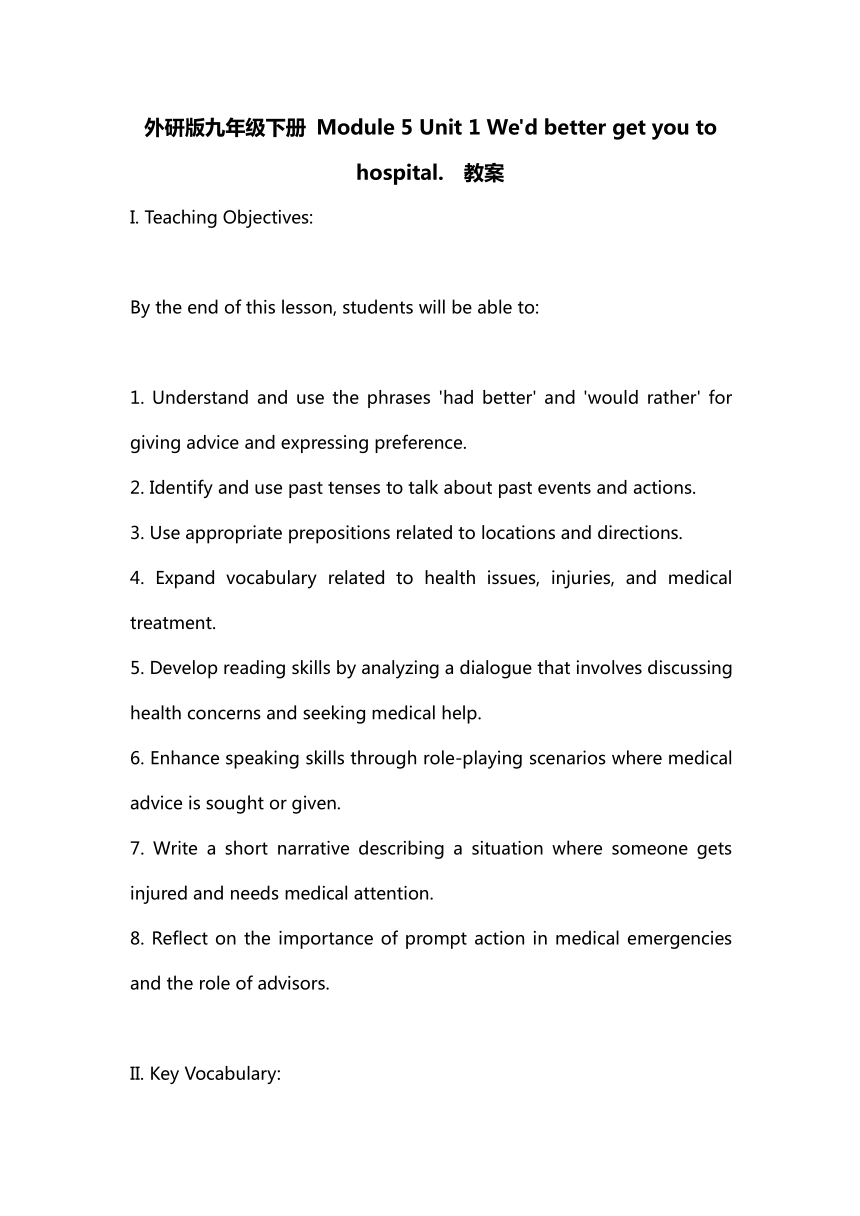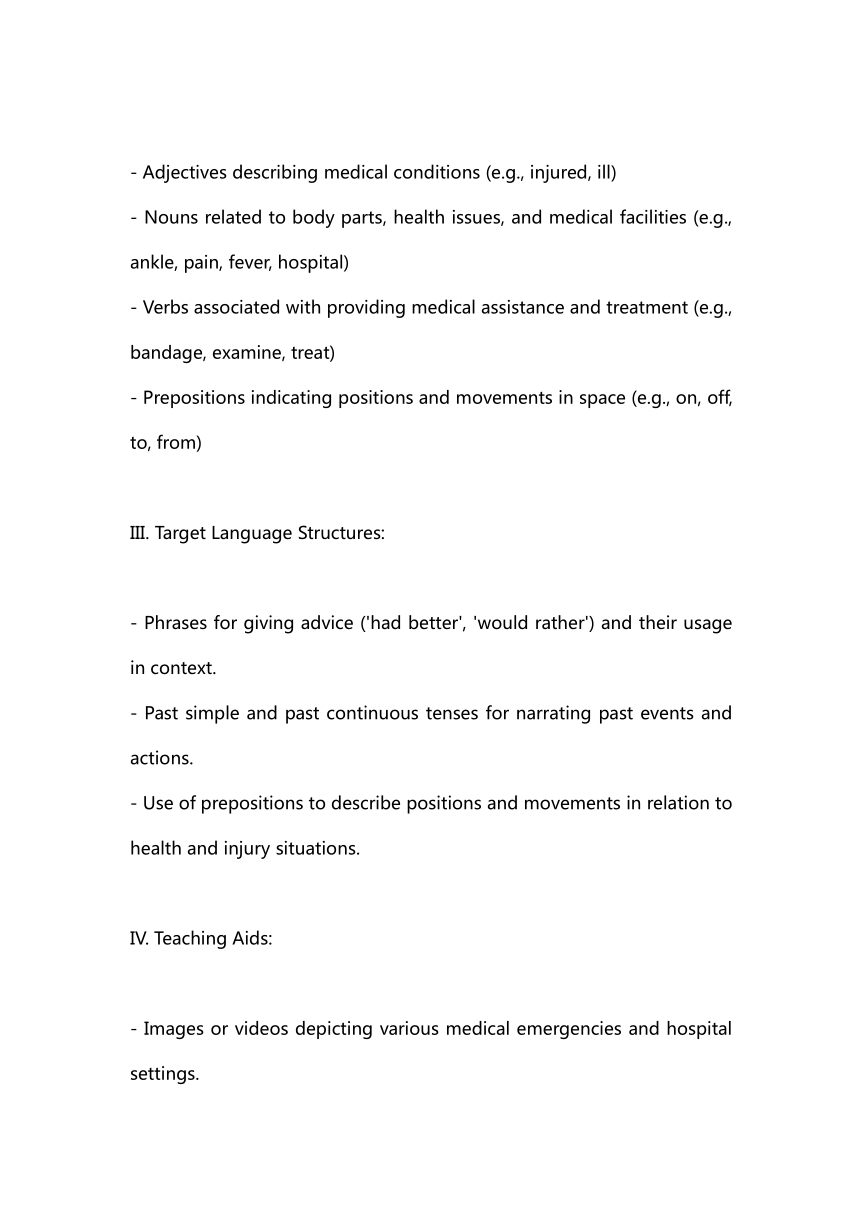外研版九年级下册Module 5 Unit 1 We'd better get you to hospital. 教案
文档属性
| 名称 | 外研版九年级下册Module 5 Unit 1 We'd better get you to hospital. 教案 |

|
|
| 格式 | docx | ||
| 文件大小 | 13.4KB | ||
| 资源类型 | 教案 | ||
| 版本资源 | 外研版 | ||
| 科目 | 英语 | ||
| 更新时间 | 2024-02-26 00:00:00 | ||
图片预览


文档简介
外研版九年级下册 Module 5 Unit 1 We'd better get you to hospital. 教案
I. Teaching Objectives:
By the end of this lesson, students will be able to:
1. Understand and use the phrases 'had better' and 'would rather' for giving advice and expressing preference.
2. Identify and use past tenses to talk about past events and actions.
3. Use appropriate prepositions related to locations and directions.
4. Expand vocabulary related to health issues, injuries, and medical treatment.
5. Develop reading skills by analyzing a dialogue that involves discussing health concerns and seeking medical help.
6. Enhance speaking skills through role-playing scenarios where medical advice is sought or given.
7. Write a short narrative describing a situation where someone gets injured and needs medical attention.
8. Reflect on the importance of prompt action in medical emergencies and the role of advisors.
II. Key Vocabulary:
- Adjectives describing medical conditions (e.g., injured, ill)
- Nouns related to body parts, health issues, and medical facilities (e.g., ankle, pain, fever, hospital)
- Verbs associated with providing medical assistance and treatment (e.g., bandage, examine, treat)
- Prepositions indicating positions and movements in space (e.g., on, off, to, from)
III. Target Language Structures:
- Phrases for giving advice ('had better', 'would rather') and their usage in context.
- Past simple and past continuous tenses for narrating past events and actions.
- Use of prepositions to describe positions and movements in relation to health and injury situations.
IV. Teaching Aids:
- Images or videos depicting various medical emergencies and hospital settings.
- Whiteboard and markers for grammar explanation and writing key sentences.
- Audio material featuring dialogues about seeking medical advice or dealing with injuries.
- Handouts with exercises on using advice phrases, past tenses, prepositions, new vocabulary, and a writing prompt for a narrative.
V. Teaching Procedures:
Step 1: Warm-up (5 minutes)
- Begin with a discussion about common health issues and how to seek help for them.
- Elicit key vocabulary from students and write it on the board.
Step 2: Listening (10 minutes)
- Play an audio track that presents a conversation where someone is giving advice on a health issue.
- After listening, ask comprehension questions to check understanding of the content.
Step 3: Speaking Practice (15 minutes)
- Students work in pairs or small groups to role-play scenarios where one person is injured and the other gives advice on what to do.
- Conduct a class activity where each group presents their role-play, focusing on the correct use of advice phrases and past tenses.
Step 4: Grammar Focus (10 minutes)
- Review the usage of 'had better' and 'would rather' for giving advice.
- Introduce and practice past simple and past continuous tenses in the context of describing medical incidents.
- Review the use of prepositions related to health and injury situations.
Step 5: Reading (10 minutes)
- Distribute a text involving a dialogue where characters discuss a health concern, guiding students through it to identify target language structures and new vocabulary.
- Ask students to summarize the main points and the advice given in the dialogue.
Step 6: Writing Task (10 minutes)
- Hand out worksheets with exercises on constructing sentences using advice phrases, past tenses, and prepositions.
- Assign a written task where students draft a short narrative about a medical emergency, based on their own experience or imagination.
Step 7: Homework & Review (5 minutes)
- Assign homework for students to complete their narrative, incorporating feedback from the writing task.
- Review key points from the lesson through a quick quiz or verbal questioning.
VI. Assessment:
- Evaluate students based on their participation in speaking activities, correct usage of advice phrases, past tenses, and prepositions in oral and written assignments, and completion of homework tasks.
- Assess listening skills through comprehension questions related to the audio content about seeking medical advice.
- Assess reading comprehension through a short quiz targeting the main points and details of the provided text about a health concern dialogue.
- Review the ability to express advice and describe past medical events using the learned language structures and vocabulary
I. Teaching Objectives:
By the end of this lesson, students will be able to:
1. Understand and use the phrases 'had better' and 'would rather' for giving advice and expressing preference.
2. Identify and use past tenses to talk about past events and actions.
3. Use appropriate prepositions related to locations and directions.
4. Expand vocabulary related to health issues, injuries, and medical treatment.
5. Develop reading skills by analyzing a dialogue that involves discussing health concerns and seeking medical help.
6. Enhance speaking skills through role-playing scenarios where medical advice is sought or given.
7. Write a short narrative describing a situation where someone gets injured and needs medical attention.
8. Reflect on the importance of prompt action in medical emergencies and the role of advisors.
II. Key Vocabulary:
- Adjectives describing medical conditions (e.g., injured, ill)
- Nouns related to body parts, health issues, and medical facilities (e.g., ankle, pain, fever, hospital)
- Verbs associated with providing medical assistance and treatment (e.g., bandage, examine, treat)
- Prepositions indicating positions and movements in space (e.g., on, off, to, from)
III. Target Language Structures:
- Phrases for giving advice ('had better', 'would rather') and their usage in context.
- Past simple and past continuous tenses for narrating past events and actions.
- Use of prepositions to describe positions and movements in relation to health and injury situations.
IV. Teaching Aids:
- Images or videos depicting various medical emergencies and hospital settings.
- Whiteboard and markers for grammar explanation and writing key sentences.
- Audio material featuring dialogues about seeking medical advice or dealing with injuries.
- Handouts with exercises on using advice phrases, past tenses, prepositions, new vocabulary, and a writing prompt for a narrative.
V. Teaching Procedures:
Step 1: Warm-up (5 minutes)
- Begin with a discussion about common health issues and how to seek help for them.
- Elicit key vocabulary from students and write it on the board.
Step 2: Listening (10 minutes)
- Play an audio track that presents a conversation where someone is giving advice on a health issue.
- After listening, ask comprehension questions to check understanding of the content.
Step 3: Speaking Practice (15 minutes)
- Students work in pairs or small groups to role-play scenarios where one person is injured and the other gives advice on what to do.
- Conduct a class activity where each group presents their role-play, focusing on the correct use of advice phrases and past tenses.
Step 4: Grammar Focus (10 minutes)
- Review the usage of 'had better' and 'would rather' for giving advice.
- Introduce and practice past simple and past continuous tenses in the context of describing medical incidents.
- Review the use of prepositions related to health and injury situations.
Step 5: Reading (10 minutes)
- Distribute a text involving a dialogue where characters discuss a health concern, guiding students through it to identify target language structures and new vocabulary.
- Ask students to summarize the main points and the advice given in the dialogue.
Step 6: Writing Task (10 minutes)
- Hand out worksheets with exercises on constructing sentences using advice phrases, past tenses, and prepositions.
- Assign a written task where students draft a short narrative about a medical emergency, based on their own experience or imagination.
Step 7: Homework & Review (5 minutes)
- Assign homework for students to complete their narrative, incorporating feedback from the writing task.
- Review key points from the lesson through a quick quiz or verbal questioning.
VI. Assessment:
- Evaluate students based on their participation in speaking activities, correct usage of advice phrases, past tenses, and prepositions in oral and written assignments, and completion of homework tasks.
- Assess listening skills through comprehension questions related to the audio content about seeking medical advice.
- Assess reading comprehension through a short quiz targeting the main points and details of the provided text about a health concern dialogue.
- Review the ability to express advice and describe past medical events using the learned language structures and vocabulary
同课章节目录
- Module 1 Travel
- Unit 1 We toured the city by bus and by taxi
- Unit 2 It's a long story.
- Unit 3 Language in use
- Module 2 Education
- Unit 1 They don't sit in rows.
- Unit 2 What do I like best about school?
- Unit 3 Language in use
- Module 3 Life now and then
- Unit 1 They sometimes work harder.
- Unit 2 I think life is better today.
- Unit 3 Language in use.
- Module 4 Rules and suggestions
- Unit 1 You must be careful of falling stones.
- Unit 2 we must keep the camp clean.
- Unit 3 Language in use.
- Revison A
- Module 5 Look after yourself
- Unit 1 We'd better get you to hospital.
- Unit 2 Get off the sofa!
- Unit 3 Language in use.
- Module 6 Eating togethe
- Unit 1 When is the school-leavers' party?
- Unit 2 Knives and forks are used for most Western
- Unit 3 Language in use
- Module 7 English for you and me
- Unit 1 Have you ever been to an English corner?
- Unit 2 We all own English.
- Unit 3 Language in use
- Module 8 My future life
- Unit 1 Here's to our friendship and the future
- Unit 2 I know that you will be better at maths.
- Unit 3 Language in use
- Revison B
